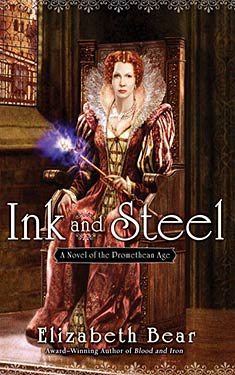Elizabeth
Bear
Completed 3/8/2020,
Reviewed 3/8/2020
4 stars
This book
seemed like two books: one a complicated
mystery and the other an “urban” fantasy, all set in Elizabethan England and
the realm of the Fae. The mystery part I
didn’t like too well. It had a lot of
characters to follow and seemed to meander.
The other part, the fantasy part, was pretty tight, especially in the
last third of the book. It didn’t make
everything come together as this is the first part of a duology. In fact, it’s the third book in a four-book
series, but this is a prequel to the first two, and it’s quite self-contained. It doesn’t end on a cliffhanger, but it doesn’t
resolve the mystery. This book, with its
sequel “Hell and Earth”, won the Gaylactic Spectrum Award in 2009.
I found the
plot pretty convoluted. There is an
organization called the Prometheans which keeps Queen Elizabeth I on the throne
of England. They do this by employing
the poet and playwright Christopher “Kit” Marlowe to write plays with magic in
them. When Kit is murdered, they bring
in the up and coming William Shakespeare to fill his shoes. Unbeknownst to the Prometheans, Kit is “resurrected”
by the faeries and a glamour buried in his place. Kit is tricked into drinking faerie wine
which binds him to the faerie world, where their Queen Maeb has special plans
for him. Kit only gets to go back to the
real world on occasion, and when he does, he meets with Will to prevent him
from being murdered as well. The two work
together to try to find the traitor in the Prometheans that murdered Kit in the
first place. While rereading this
paragraph, I realize it doesn’t sound convoluted, but trust me, in reading the
book, the plot is anything but clear.
Kit and Will
are the two main characters. The point
of view of the book alternates between the two of them, following them as their
relationship and the mystery develops.
Kit is a gay atheist, who supposedly blasphemes as he lay dying. This makes him and his works anathema, so the
contact between Kit and Will is very secretive.
The two even write letters with invisible content to each other (the lemon
juice trick) to protect Will. And since
time is different in the two worlds, each doesn’t know how much time has gone
by in the other. It is during these
written and physical encounters that their characters really develop. When the other Prometheans are involved, it’s
just a mess of too many people under suspicion.
In terms of
character development, I really liked how we get to know Will not only through
his relationship with Kit, but also with his wife Anne. For the most part, he is living in London
while she is in Stratford. He regrets
not seeing her and his children, but he’s pretty much bound to working in
London, where there is plague. And he
probably can’t afford to keep them in London anyway. This conflict tells us a lot about Will and
also about Anne as well. We don’t get
her perspective, but it comes through the dialogue we do get between the two of
them.
Speaking of
the dialogue, it is written in very Elizabethan English, with the non-dialogue
parts in modern English. I found it very
difficult to get into. This may have
been why I found the mystery part, which is mostly in the first two-thirds, such
a slog. This happens when I see a
Shakespearean play as well. It usually
takes my ear some time to get accustomed to the old English. But reading it was very difficult. And the dialogue isn’t very direct; it’s very
circuitous. It seems that no one says
what they mean, and when they do it’s not always very clear. So besides the plethora of suspects, where I
couldn’t remember who was who, I usually had trouble figuring out who or what
they were talking about.
The best part
of the book is the last third. It’s
simply riveting. It takes place in
Faerie and in Hell. Lucifer makes an
appearance before this section, but obviously plays heavily in this part. You see, the realm of Faerie is protected by Hell,
and they must tithe one Fae every seven years as their payment for this
service. Saying anything more would be a
spoiler, but Kit and Will are both involved in this part of the book.
Despite my
trouble getting into it, once I did, I couldn’t put it down. In fact, I eventually want to get to the next
book because of that. So I’m giving it
four stars out of five. I think if you enjoy
reading Shakespeare’s plays, you’ll like this as well. The prose is wonderful. And I think that if you like mysteries, you
might also like this. The bummer is that
it’s not been published in e-reader format.
I don’t know if it’s still in print; I got my copy from the
library. But I do recommend this book if
you’re willing to give it some effort, because it does require some heavy
concentration.

No comments:
Post a Comment